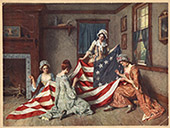Libraries, University of Nebraska-Lincoln
Document Type
Archival Material
Date of this Version
1-8-1836
Citation
Eulogy on King Philip as Pronounced at The Odeon, in Federal Street, Boston, by the Rev. William Apess, an Indian, January 8, 1836. Second Edition. Boston, 1836.
Abstract
In the heart of New England, on the virtual doorstep of the Pilgrim founding fathers, William Apess delivered this eulogy honoring their greatest enemy, Metacomet of the Wampanoags, known as King Philip, who led a coalition of Native peoples that came close to destroying the whole English colonial enterprise in 1675–76. In 1836, one hundred sixty years later, Apess chose to re-examine the circumstances of King Philip’s life and death, and pronounced him equal to or even greater than Washington in love for his country, military skill, and personal honor. While redeeming the memory of Philip as a martyr for his people, Apess takes the opportunity to indict white Christian Americans for the false promises, broken treaties, murders, enslavements, and other oppressions visited upon the Native inhabitants by the European invaders.
“We say, therefore, let every man of color wrap himself in mourning, for the 22d of December and the 4th of July are days of mourning and not of joy.… the prayers, preaching, and examples of those pretended pious, has been the foundation of all the slavery and degradation in the American colonies, towards colored people.”
Apess’ was a brave voice amid the prejudice and Indian Removal policies dominant in the United States. His Eulogy is an early cry by a Native author for equity, for recognition, for common humanity, and for reconciliation: “you and I have to rejoice that we have not to answer for our fathers’ crimes, neither shall we do right to charge them one to another.”
William Apess (1798–1839) was born to Pequot parents, grew up among whites as an indentured servant before running away to join the militia in the War of 1812. He became a Methodist minister, preacher, author, and publisher, advocating for Native rights and for anti-slavery causes.


